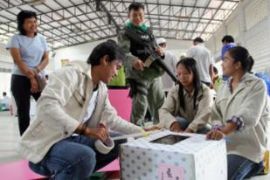Voting closes in Thai referendum
Exit poll indicates majority support for the military-backed constitution.

Published On 19 Aug 2007
More than 20,000 people across Thailand were questioned in the exit poll, which has a margin of error of five percentage points.
The first ballot counts from election officials are not expected for several hours, but officials say they expect to announce the result late on Sunday.
Victory claim
Surayud Chulanont, Thailand’s prime minister, claimed victory after the exit poll result emerged.
“We consider that this constitution has been approved by the people, and by the end of August the constitution will be submitted to the king for endorsement,” Surayud said on national television.
Sarayud said that general elections would be held by the end of the year.
“I reaffirm that the election will be held late this year. The exact date is still under consideration, but I believe the most suitable date is after the king’s birthday” on December 5, he said, about 30 minutes after polling ended.
Defeat conceded
Members of the Thai Rak Thai (TRT), Thailand’s former ruling party, said they accepted defeat, despite the full result of the vote not being returned.
“We accept the result of the referendum, and the promulgation of this constitution,” said Chaturon Chaisang, one-time leader of the TRT, which is now banned.
Chaisang said the TRT did not support the constitution, and the referendum “was not conducted in a way that meets democratic standards.”
“Government officials have misled the people by telling them there would be no elections if the constitution did not pass. They restricted the freedom of expression of people in the areas under martial law,” he said.
Majority required
Some 45 million voters were eligible to vote in the referendum, and a simple majority will be enough to approve the charter.
If the charter is in fact rejected by voters, the government can impose one of Thailand’s 17 previous charters and amend it as they please.
Democracy advocates argue that it rolls back reforms and could allow the military to hold sway over future governments instead.
The military forced Thaksin Shinawatra, the twice-elected prime minister, from power in September last year.
Campaigning was tilted heavily in the government’s favour, with half the country under martial law and a new law threatening prison for anyone convicted of obstructing the referendum.
Source: News Agencies